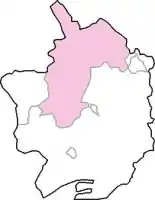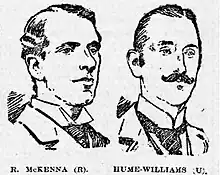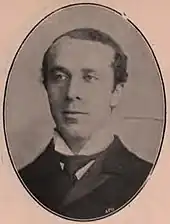North Monmouthshire (UK Parliament constituency)
Northern Monmouthshire was a parliamentary constituency in Monmouthshire. It returned one Member of Parliament (MP) to the House of Commons of the Parliament of the United Kingdom.
| Northern Monmouthshire | |
|---|---|
| Former County constituency for the House of Commons | |
| 1885–1918 | |
| Seats | one |
| Created from | Monmouthshire |
| Replaced by | Monmouth and Pontypool |
History
The constituency was created by the Redistribution of Seats Act 1885 for the 1885 general election. It was abolished for the 1918 general election.
Boundaries

The constituency comprised the Petty Sessional Divisions of:
- Abergavenny (The civil parishes of Abergavenny, Abergavenny Rural, Bwlch-Trewyn, Cwmyoy Upper, Cwmyoy Lower, Llanellen, Llanfoist, Llangattock, Llingoed, Llangattock-nigh-Usk, Llanover Lower, Llansaintffraed, Llanthewy-Rytherch, Llanthewy-Skirrid, Llantillio-Pertholey, Llanvapley, Llanvetherine, Llanvihangel-Crucorney, Llanvihangel-nigh-Usk, Llanwenarth Citra, Llanwenarth Ultra and Oldcastle)
- Pontypool (Abersychan, Blaenavon, Glascoed, Goytre, Llanvair Kilgedin, Llanhilleth, Llanvihangel-Pontymoile, Llanfrechfa (Upper), Mamhilad, Panteg, Pontypool and Trevethin)
- and Skenfrith (Grosmont, Llangattock Vibon Avel, Llangua, Llantilio Crossenny, Llanvihangel-Ystern-Llewern and St Maughans, Skenfrith)[1]
On abolition by the Representation of the People Act 1918, the area of the constituency was included in the Monmouth and Pontypool constituencies.
Members of Parliament
| Election | Member | Party | |
|---|---|---|---|
| 1885 | Thomas Phillips Price | Liberal | |
| 1895 | Reginald McKenna | Liberal | |
| 1918 | constituency abolished | ||
Election results
Elections in the 1880s
| Party | Candidate | Votes | % | ±% | |
|---|---|---|---|---|---|
| Liberal | Thomas Price | 5,693 | 63.8 | ||
| Conservative | John Rolls | 3,236 | 36.2 | ||
| Majority | 2,457 | 27.6 | |||
| Turnout | 8,929 | 83.4 | |||
| Registered electors | 10,705 | ||||
| Liberal win (new seat) | |||||
| Party | Candidate | Votes | % | ±% | |
|---|---|---|---|---|---|
| Liberal | Thomas Price | 4,688 | 58.8 | −5.0 | |
| Conservative | Edward Jones[4] | 3,285 | 41.2 | +5.0 | |
| Majority | 1,403 | 17.6 | −10.0 | ||
| Turnout | 7,973 | 74.5 | −8.9 | ||
| Registered electors | 10,705 | ||||
| Liberal hold | Swing | −5.0 | |||
Elections in the 1890s
| Party | Candidate | Votes | % | ±% | |
|---|---|---|---|---|---|
| Liberal | Thomas Price | 5,020 | 56.5 | −2.3 | |
| Conservative | John Rolls | 3,863 | 43.5 | +2.3 | |
| Majority | 1,157 | 13.0 | −4.6 | ||
| Turnout | 8,883 | 73.2 | −1.3 | ||
| Registered electors | 12,130 | ||||
| Liberal hold | Swing | −2.3 | |||

| Party | Candidate | Votes | % | ±% | |
|---|---|---|---|---|---|
| Liberal | Reginald McKenna | 4,965 | 54.2 | −2.3 | |
| Conservative | Ellis Hume-Williams | 4,203 | 45.8 | +2.3 | |
| Majority | 762 | 8.4 | −4.6 | ||
| Turnout | 9,168 | 78.5 | +5.3 | ||
| Registered electors | 11,674 | ||||
| Liberal hold | Swing | −2.3 | |||
Elections in the 1900s

| Party | Candidate | Votes | % | ±% | |
|---|---|---|---|---|---|
| Liberal | Reginald McKenna | 5,139 | 57.9 | +3.7 | |
| Conservative | De Fonblanque Pennefather | 3,740 | 42.1 | −3.7 | |
| Majority | 1,399 | 15.8 | +7.4 | ||
| Turnout | 8,879 | 79.6 | +1.1 | ||
| Registered electors | 11,159 | ||||
| Liberal hold | Swing | +3.7 | |||
| Party | Candidate | Votes | % | ±% | |
|---|---|---|---|---|---|
| Liberal | Reginald McKenna | 7,730 | 71.0 | +13.1 | |
| Conservative | Charles Campbell | 3,155 | 29.0 | −13.1 | |
| Majority | 4,575 | 42.0 | +26.2 | ||
| Turnout | 10,885 | 81.2 | +1.6 | ||
| Registered electors | 13,411 | ||||
| Liberal hold | Swing | +13.1 | |||
| Party | Candidate | Votes | % | ±% | |
|---|---|---|---|---|---|
| Liberal | Reginald McKenna | Unopposed | |||
| Liberal hold | |||||
Elections in the 1910s
| Party | Candidate | Votes | % | ±% | |
|---|---|---|---|---|---|
| Liberal | Reginald McKenna | 8,596 | 66.5 | −4.5 | |
| Conservative | Evelyn Carmichael | 4,335 | 33.5 | +4.5 | |
| Majority | 4,261 | 33.0 | −9.0 | ||
| Turnout | 12,931 | 82.3 | +1.1 | ||
| Registered electors | 15,711 | ||||
| Liberal hold | Swing | −4.5 | |||
| Party | Candidate | Votes | % | ±% | |
|---|---|---|---|---|---|
| Liberal | Reginald McKenna | 7,722 | 62.7 | −3.8 | |
| Conservative | David Ellis Williams | 4,586 | 37.3 | +3.8 | |
| Majority | 3,136 | 25.4 | −7.6 | ||
| Turnout | 12,308 | 78.3 | −4.0 | ||
| Registered electors | 15,711 | ||||
| Liberal hold | Swing | −3.8 | |||
General Election 1914–15:
Another General Election was required to take place before the end of 1915. The political parties had been making preparations for an election to take place and by the July 1914, the following candidates had been selected;
- Liberal: Reginald McKenna
- Unionist: David Ellis Williams
- Labour: James Winstone
References
- Schedule Seven, Redistribution of Seats Act 1885 (48 & 49 Vict. C. 23)
- The Liberal Year Book, 1907
- Craig, FWS, ed. (1974). British Parliamentary Election Results: 1885-1918. London: Macmillan Press. ISBN 9781349022984.
- "North Monmouthshire". Western Mail. 1 July 1886. p. 7. Retrieved 4 December 2017 – via British Newspaper Archive.
- Debrett's House of Commons & Judicial Bench, 1901
- Debrett's House of Commons & Judicial Bench, 1916